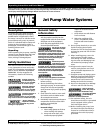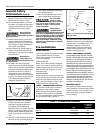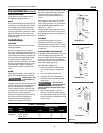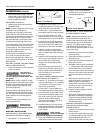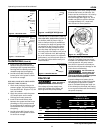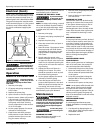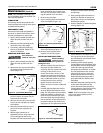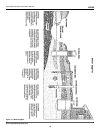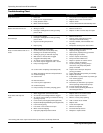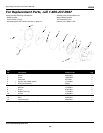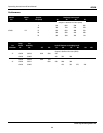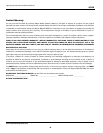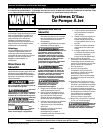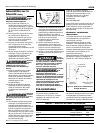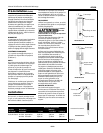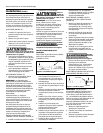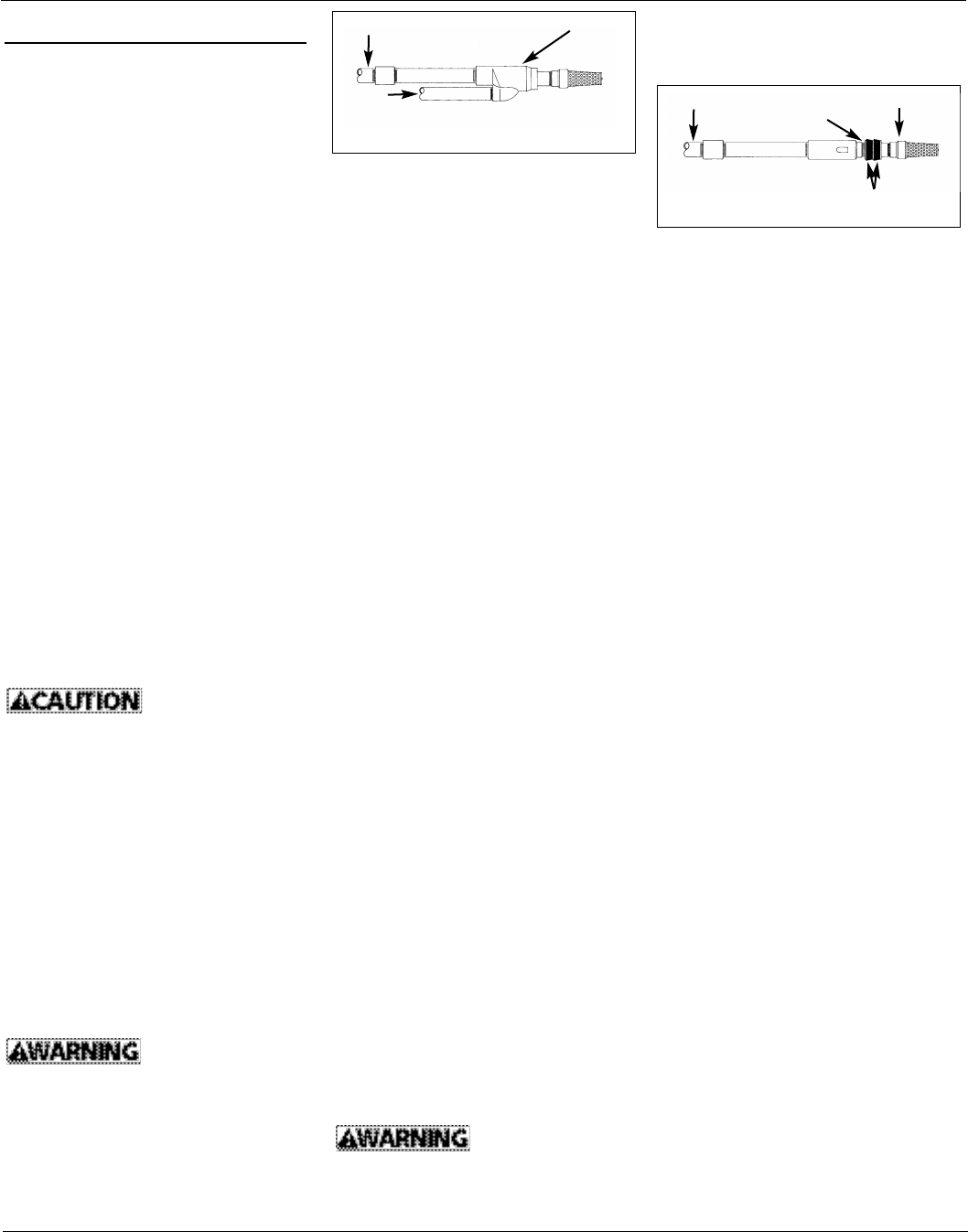
included) to the jet body. A 1
1
/4”
coupling is required to connect the
larger pipe to the jet assembly.
2. Connect the 1” pipe threads into
the smaller opening in the jet body.
3. Lower the jet into the well. Add
pipe as needed. Be sure to use pipe
joint compound on all male threads.
4. Position the jet 10 - 20 feet below
the lowest anticipated water level,
but never closer than 5 feet from
the bottom of the well, if possible.
5. Install a well seal to support the
pipe and prevent surface water and
other contaminants from entering
the well.
6. Install the horizontal pipe from the
well to the pump. Piping from the
vertical well pipe to the pump
should never be smaller than the
well pipes.
7. Slope both pipes upward toward
the pump to prevent trapping air. If
the horizontal distance exceeds 25
feet, see Chart 2 for the recom-
mended pipe sizes.
DUG WELL, CISTERN, LAKE AND SPRING
WITH TWO PIPE JET (FIGURE 15)
1. Install a 1
1
/4” foot valve (not includ-
ed) to the jet body. A 1
1
/4” coupling
is required to connect the larger
pipe to the jet assembly.
2. Connect the 1” pipe threads into
the smaller opening in the jet body.
3. Lower the jet into the water below
the lowest anticipated water level,
but never closer than 18” from the
bottom. Sand or debris may be
drawn into the system if the jet is
too close to the bottom.
4. Provide protection for the jet and
pipes against damage from boats or
swimmers if a lake is used for the
water supply.
Install a screen
around the inlet
pipe
to prevent the entrapment of swimmers.
5. Slope the horizontal pipes upward
toward the pump to prevent trap-
4
ping air. If horizontal distance
exceeds 25 feet, see Chart 2 for rec-
ommended pipe sizes.
DRILLED WELL (2”) WITH SINGLE PIPE
PACKER (FIGURES 15 AND 5)
NOTE: Single pipe packer jets rely on
the space between single pipe and
inside of well casing for return water
to operate jet. Two inch installations
must use 1
1
/4” galvanized steel pipe
with special turned couplings (1
13
/16”
O.D.) to avoid restricting flow of return
water back to jet.
1. Assemble the foot valve and packer
to the jet body.
2. Lubricate the rubber cups with
petroleum jelly.
3. Attach the first section of pipe and
lower jet into well.
4. Add pipe until the jet is positioned
5 - 15 feet below the lowest antici-
pated water level. The jet should
never be closer than 5 feet from the
bottom of the well or sand and sed-
iment may be drawn into the sys-
tem.
5. With the jet in position, fill the
pipes with water to make sure the
rubber cups are sealed against
inside of the well casing. It may be
necessary to move the jet up and
down to seat the cups.
6. Install the casing adapter and the
horizontal pipes.
7. Slope both pipes upward toward
the pump to eliminate trapping air.
If the horizontal distance exceeds
25 feet, see Chart 2 for the recom-
mended pipe sizes.
DEEP WELL PUMP WITH HORIZONTAL
AND VERTICAL STORAGE TANK
(FIGURES 6 AND 7)
1. Install the air volume control on the
tank as shown.
2. Connect the copper tube from the
air volume control to the 1/8” NPT
opening directly above the 1
1
/4”
opening on the front of the pump.
Installation (Cont’d)
5. Slope the horizontal pipe upward
toward the pump to eliminate trap-
ping air. Sloping the pipe will also
aid in priming the pump.
DRIVEN WELL (FIGURE 15)
1. Drive the point several feet below
the water table.
NOTE: A packer type foot valve can be
installed in the well (Figure 3,
Illustration B). This type of foot valve
allows the well to be filled with water
when priming and makes the inlet pipe
much easier to test for leaks. Follow
the manufacturer’s instructions when
installing the packer type foot valve.
As an alternative, an in-line check valve
can be used with a driven well (Figure
3, Illustration C). The pipe between the
check valve and the water level will
always be under a vacuum.
Leaking joints or couplings will allow
air to leak into the pipe and cause
abnormal pump operation. Make sure
to use pipe joint compound on all male
pipe threads.
DUG WELL, CISTERN, LAKE AND SPRING
INSTALLATION (FIGURE 15)
1. Install a foot valve on inlet pipe and
lower into water.
The foot valve
should be at least
18” from the bottom of the well or
sand or sediment could be drawn into
the system.
NOTE: When a lake is used as a water
supply, make sure the inlet pipe is deep
enough to be submerged at all times.
Protect the pipe from damage from
swimmers and boats.
Slope the horizontal piping upward
toward the pump to prevent trapping
air. The pipe must be removed during
winter months or protected against
freezing.
Protect the pipe from damage from
swimmers and boats.
Install a screen
around the inlet
pipe to prevent the entrapment of swim-
mers.
DEEP WELL INSTALLATION
DRILLED WELL (4” OR LARGER) WITH
TWO PIPE JET (FIGURES 15 AND 4)
1. Assemble a 1
1
/4” foot valve (not
Operating Instructions and Parts Manual
JCU50
Jet Body
1
1
/4” Pipe
Foot Valve
Figure 4 - Two Pipe Jet
1”
Pipe
1
1
/4” Pipe
Foot Valve
Figure 5 - Single Pipe Jet
Packer
Cups
www.waynewatersystems.com



